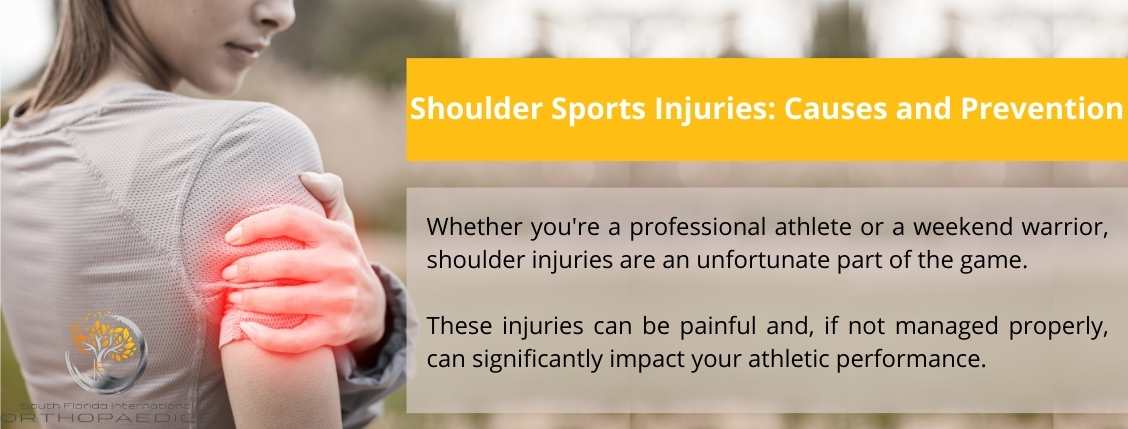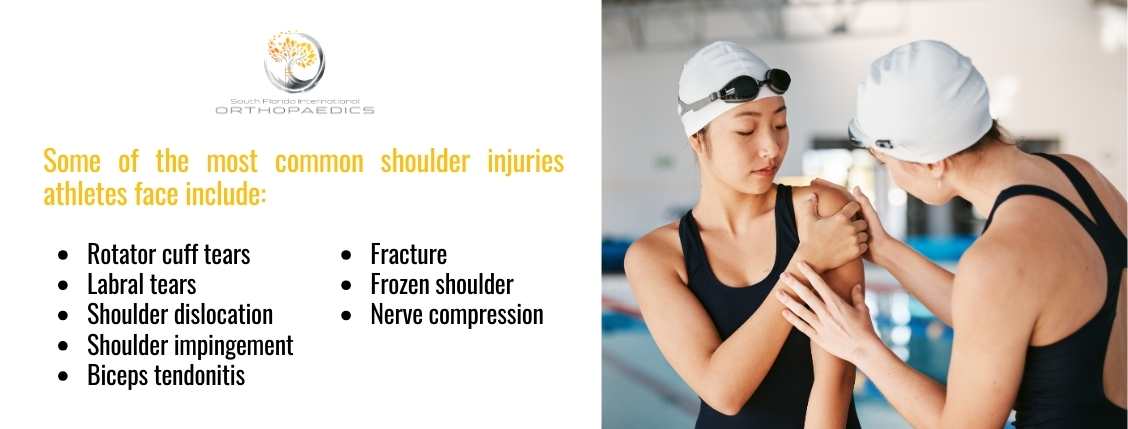Whether you’re a professional athlete or a weekend warrior, shoulder injuries are an unfortunate part of the game. These injuries can be painful and, if not managed properly, can significantly impact your athletic performance.
In this comprehensive guide, we’ll delve into the most common sports injuries involving the shoulder, their causes, prevention, treatment, and how South Florida Orthopedics can help you get back in the game stronger than ever.

What are the common shoulder injuries in sports?
Shoulder injuries are particularly prevalent in sports that involve repetitive overhead motions or intense physical contact. Some of the most common shoulder injuries athletes face include:
1. Rotator cuff tears
The rotator cuff is a group of tendons and muscles that stabilize the shoulder joint. Tears in these tendons can occur gradually from overuse or suddenly from a traumatic injury.
2. Shoulder dislocation
In sports like football and basketball, violent impacts can lead to shoulder dislocations where the upper arm bone (humerus) pops out of the shoulder socket.
3. Labral tears
The labrum is the cartilage that surrounds the rim of the shoulder socket. Athletes, especially baseball players, are prone to labral tears.
4. Shoulder impingement
Repetitive overhead movements can lead to impingement, where the rotator cuff tendons are pinched between the upper arm bone and the shoulder blade.
5. Biceps tendonitis
Overuse of the biceps tendon can lead to inflammation and tendonitis. Athletes involved in activities that require frequent arm and shoulder movements, like weightlifting and swimming, are at risk.
6. Fractures
Sports with heavy physical contact, such as rugby and martial arts, can result in shoulder fractures. These may involve the collarbone, the upper arm bone, or the shoulder blade.
7. Frozen shoulder (adhesive capsulitis)
While not directly caused by sports, a frozen shoulder can limit an athlete’s ability to perform. It results in stiffness and reduced range of motion, which can be problematic for any sport.
8. Nerve compression (brachial plexus injury)
High-impact sports can sometimes lead to nerve compression injuries, affecting the brachial plexus, a network of nerves controlling arm and hand movements.
What are the signs and symptoms of a shoulder injury?
Recognizing the signs and symptoms of a shoulder injury is the first step in addressing the issue promptly. Here are some symptoms that might indicate a looming shoulder problem:
- Pain: Persistent or sharp pain in the shoulder, especially during movement.
- Weakness: Difficulty lifting, carrying, or rotating the arm.
- Instability: A sensation of the shoulder feeling loose or unstable.
- Limited range of motion: Difficulty moving the arm through its full range of motion.
- Swelling or bruising: Visible signs of inflammation or discoloration around the shoulder.
What sport has the most shoulder injuries?
The sport with the most shoulder injuries can vary depending on factors such as the level of play, specific movements, and the intensity of the sport.

However, some sports are more commonly associated with a higher incidence of shoulder injuries due to the nature of their movements and demands. These sports include:
- Football
- Rugby
- Ice hockey
- Wrestling
- Gymnastics
- Swimming
- Tennis
- Volleyball
When should I see a doctor for my shoulder injury?
If you experience severe pain, significant swelling, or a visible deformity, it’s essential to seek immediate medical attention.
Even with milder symptoms, it’s advisable to consult a physician who specializes in Miami sports medicine to get a proper diagnosis. The treatment for a shoulder injury depends on the type and severity of the injury. Initial steps may include:
- Rest: Avoid activities that exacerbate the injury.
- Ice: Applying ice to reduce pain and swelling.
- Compression: Using a compression bandage to provide support.
- Elevation: Keeping the injured shoulder elevated to reduce swelling.
In cases where conservative treatment may not be sufficient, surgery becomes a consideration. Common surgical interventions for shoulder injuries include rotator cuff repair, labral repair, and shoulder dislocation surgery.
What is the recovery timeline for shoulder injuries?
Recovery from a shoulder injury is a gradual process, and the timeline varies depending on the injury’s nature and severity. It may take weeks to several months to fully recover. The recovery process may involve the following:
- Physical therapy: A structured rehabilitation program is often necessary to regain strength and mobility.
- Rehabilitation exercises: This is a crucial component of the recovery process, tailored to the specific injury. Some common exercises include rotator cuff strengthening, scapular strengthening, and range of motion exercises.
- Gradual return to sports: Athletes must follow a gradual return-to-play plan to avoid re-injury.
How can you prevent shoulder injuries?
Preventing shoulder injuries is crucial for athletes and active individuals. Here are some strategies and precautions to help prevent shoulder injuries:
- Warm-up and stretching: Always start with a thorough warm-up to increase blood flow to the muscles and prepare the shoulder joint for activity.
- Strength and conditioning: A well-rounded strength and conditioning program can provide stability and support for the shoulder joint.
- Proper technique: Ensure you use proper technique and form when performing sports-specific movements.
- Gradual progression: Avoid overloading the shoulder with sudden, intense workouts or activities. Gradually increase the intensity and duration of your training to allow the shoulder to adapt and strengthen over time.
- Use protective gear: If your sport requires it, wear appropriate protective gear such as shoulder pads, braces, or taping to provide added support and reduce the risk of injury.
- Rest and recovery: Allow your shoulder adequate time to recover between intense training sessions or competitions.
- Consult a professional: If you’re new to a sport or exercise program or have a history of shoulder injuries, consider consulting a sports medicine specialist, physical therapist, or coach for guidance on injury prevention and tailored exercise programs.
Where to find the best shoulder specialist in Miami?
Are you in search of top-tier orthopedic care, especially when it comes to your shoulders? Look no further than South Florida International Orthopaedics.
Our commitment to excellence, cutting-edge expertise, and patient-centered approach make us the best choice for all your orthopedic needs.
At SFIO, our team of orthopedic specialists is second to none. With extensive experience in diagnosing and treating a wide range of shoulder conditions, our experts are leaders in the field of orthopedics.
Request an appointment today and experience the SFIO difference!

The material contained on this site is for informational purposes only and DOES NOT CONSTITUTE THE PROVIDING OF MEDICAL ADVICE, and is not intended to be a substitute for independent professional medical judgment, advice, diagnosis, or treatment. Always seek the advice of your physician or other qualified healthcare providers with any questions or concerns you may have regarding your health.
